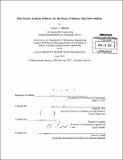Skin strain analysis software for the study of human skin deformation
Author(s)
Marecki, Andrew T. (Andrew Thomas)
DownloadFull printable version (9.973Mb)
Other Contributors
Massachusetts Institute of Technology. Dept. of Mechanical Engineering.
Advisor
Hugh M. Herr.
Terms of use
Metadata
Show full item recordAbstract
Skin strain studies have never been conducted in a precise and automated fashion. Previous in vivo strain investigations have been labor intensive and the data resolution was extremely limited such that their results were largely qualitative. There is a need for a better system to collect, compute, and output strain measurements of the skin in vivo for the purpose of designing better mechanical interfaces with the body. Interfaces that have the same strain behavior as human skin can minimize shear forces and discomfort for the user. One particular application is improving the design of prosthetic liners for amputees, creating a second skin sleeve that provides support without hindering movement. A custom approach offering high resolution marker density, automatic point tracking and correspondences, and computational transparency is presented in this thesis. The entire computational toolbox is presented, which takes in high resolution digital photographs, tracks points on the surface of the body, corresponds points between body poses, computes a series of strain measures, and graphically displays these data. The results of studies of a full bodied human knee and a transtibial amputee's residual limb are presented here as well.
Description
Thesis (S.M.)--Massachusetts Institute of Technology, Dept. of Mechanical Engineering, 2012. Cataloged from PDF version of thesis. Includes bibliographical references (p. 58).
Date issued
2012Department
Massachusetts Institute of Technology. Department of Mechanical EngineeringPublisher
Massachusetts Institute of Technology
Keywords
Mechanical Engineering.